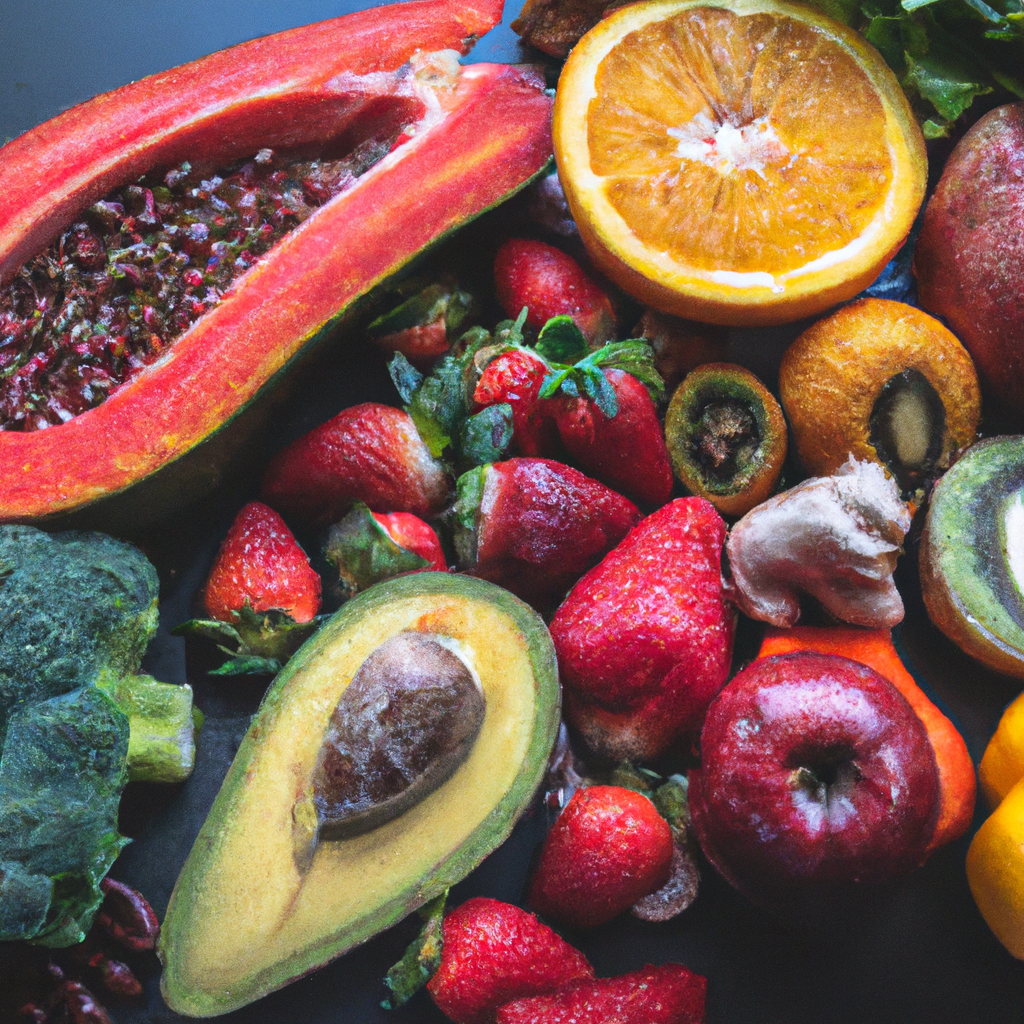Vitamins And Minerals: The Unsung Heroes Of Weight Loss
Have you ever thought about the role of vitamins and minerals in your weight loss journey? Well, it’s time to shift your focus a bit and understand vitally important, yet often overlooked factors that could be the key to your fitness regime – Vitamins and Minerals – the unsung heroes of weight loss. This article shines a spotlight on those essential micronutrients that don’t just assist in maintaining a healthy body, but also play a significant part in weight loss. Through this piece, you’ll gain valuable insights into the perfect blend of vitamins and minerals that could be your secret weapon in reaching your weight loss goals.

Importance of Vitamins and Minerals for Weight Loss
In your weight loss journey, you may focus primarily on major factors, like calorie intake and exercise. But don’t underestimate the power of vitamins and minerals. These are the unsung heroes of weight loss and health. Not only do they play a huge part in your metabolism, they also contribute to other body functions that aid in shedding those extra pounds.
The role of vitamins and minerals in metabolism
your body’s metabolism involves a complex web of chemical processes to keep you running. This includes breaking down food for energy and constructing or synthesizing cellular components. Vitamins and minerals are essential co-factors in these processes. Different kinds of vitamins and minerals fulfil different roles, but all are crucial in maintaining a healthy metabolism.
How micronutrients aid in weight loss
Weight loss isn’t simply about eating less, it’s about nourishing your body with the right kinds of foods so it functions optimally. Vitamins and minerals play a key role in appetite suppression, energy production, and even fat burning. When your body is well-nourished, it’s able to efficiently metabolize fat and keep your energy levels up, which aids in weight loss.
Vitamin and mineral deficiencies and their impact on weight
A lack of certain vitamins and minerals can disrupt your metabolic process and significantly impact your weight-loss efforts. For example, vitamin D deficiency has been linked to obesity and metabolic syndrome. Similarly, insufficient intake of other nutrients, such as calcium or iron, can lead to cravings and overeating, slowing down weight loss.
Key Vitamins for Weight Loss
Each vitamin contributes to weight loss in unique ways. Here are some key vitamins that you should ensure are a part of your diet.
Vitamin D
Also known as the sunshine vitamin, vitamin D plays a vital role in weight loss. Studies have found that people with adequate vitamin D intake tend to lose more weight compared to those with a deficiency. It’s also been associated with reducing the formation of fat cells and suppressing the storage of fat.
Vitamin B12
This important vitamin assists in metabolizing proteins and fat. When you have sufficient levels of B12, your body is more efficient in converting nutrients into energy. This promotes muscle development and fat burning, assisting in your weight loss journey.
Vitamin C
Vitamin C is not just for warding off colds. Adequate levels of this vitamin can aid weight loss by helping your body oxidize fat during moderate-intensity exercise.
Vitamin E
This nutrient is just as essential for weight loss. It is known for its antioxidant properties which aid in the prevention of cellular damage. It also helps with metabolism.
Vitamin A
Apart from its vital role in vision, vitamin A is essential for the regulation of genes involved in fat cell development. Maintaining an adequate intake of this vitamin is an underestimated but vital part of the weight loss puzzle.
The Power of Mineral Supplementation
While vitamins steal the spotlight, minerals are much needed for your weight loss journey. Certain minerals can significantly contribute to your weight loss goals, here are a few to take into account.
Calcium and weight loss
An essential mineral for bone health, Calcium also has its credit in weight loss. Studies suggest that it can help to burn fat and that a high-calcium diet can lead to greater weight loss.
Iron and weight loss
Iron plays a role in creating energy from nutrients. An Iron deficiency can affect your metabolism and lead to weight gain or prevent weight loss. So, loading up on Iron-rich food can help your weight loss mission.
Magnesium and weight loss
This mineral is key to the body’s metabolic health. Magnesium is essential for regulating metabolism and energy production, both of which are crucial for weight loss.
Zinc and weight loss
Zinc plays a considerable role in appetite control and glucose metabolism. It’s also involved in taste and smell, which inevitably interacts with what and how much we eat.
Potassium and weight loss
Potassium helps maintain the balance of electrolytes in your body and aids in muscle function. This is especially important when exercising for weight loss.

The Impact of Antioxidants
Antioxidants are natural molecules that occur in certain foods. They help neutralize harmful free radicals in our bodies and have been linked to many health benefits including help in weight management.
Role of antioxidants in weight management
There is growing research suggesting that consuming antioxidant-rich foods might improve weight loss by increasing metabolism and fat oxidation, reducing inflammation and enhancing the benefits of exercise.
Vitamin A as an antioxidant
Known for its role in vision, vitamin A also helps combat free radicals. By neutralizing the oxidation process, it helps your body perform optimally, aiding in weight loss.
Vitamin C as an antioxidant
Among its many functions is its role as a potent antioxidant. It helps defend your cells from damage caused by potentially harmful molecules known as free radicals.
Vitamin E as an antioxidant
Vitamin E is a powerful antioxidant that helps protect your cells from damage. This protection can help prevent metabolic syndrome, a condition often leading to weight gain.
B Vitamins for Energy and Metabolism
The family of B vitamins are known for their role in energy production and metabolism. Ensuring adequate intake helps boost your metabolism and aids in weight loss.
Vitamin B1 (Thiamine)
This vitamin plays a crucial role in converting carbohydrates into energy, which is important for metabolism and weight loss.
Vitamin B2 (Riboflavin)
Riboflavin helps break down proteins, fats, and carbohydrates. It plays a crucial role in maintaining the body’s energy supply.
Vitamin B3 (Niacin)
Apart from assisting in the functioning of the digestive system, skin and nerves, niacin also aids in converting food into energy.
Vitamin B5 (Pantothenic Acid)
This vitamin helps break down fats and carbs for energy. It’s also involved in hormone production and cholesterol balance.
Vitamin B6 (Pyridoxine)
Just like the other B vitamins, Vitamin B6 is also essential in converting food to energy. It is especially important in metabolizing protein.
Vitamin B7 (Biotin)
Known for boosting the health of hair and skin, biotin also aids in metabolism of both energy and nutrients like fatty acids and glucose.
Vitamin B9 (Folate)
Folate plays a crucial role in the formation of DNA, enabling cells to divide. It also aids in metabolizing proteins.
Vitamin B12 (Cobalamin)
Often linked with weight loss, Vitamin B12 helps convert fats and proteins into energy and aids in the breakdown of carbohydrates.
Minerals for Healthy Metabolism
Just like vitamins, minerals are also essential for robust metabolic health. Let’s take a look at some prominent ones.
Role of minerals in energy production
Broadly speaking, some key minerals like Iron, Calcium, and Magnesium are essential for energy production and are crucial for cellular function, which directly impacts metabolism.
Calcium for metabolism
Calcium is essential for energy processing. It activates enzymes involved in fat metabolism, thus potentially assisting in weight loss.
Magnesium for metabolism
It helps regulate various biochemical reactions in the body, including protein synthesis, muscle and nerve function, and energy production. No surprises it aids in weight loss.
Zinc for metabolism
Zinc is involved in nearly every aspect of metabolism. It influences the body’s hormonal balance and can also help to boost your metabolism, which can lead to weight loss.
Iron for metabolism
Iron is essential for creating energy from nutrients. It also contributes to the health of your metabolic pathways, which can encourage weight loss by burning more calories.
Copper for metabolism
Copper is involved in various important metabolic functions, including energy production, iron metabolism, and brain function.
Vitamins and Minerals as Appetite Suppressants
Certain vitamins & minerals play a key role in controlling your diet and enhancing your weight loss journey, acting as natural hunger suppressants.
Niacin (Vitamin B3)
Niacin plays a role in controlling your appetite, ultimately helping you to eat less, exercise more, and lose weight.
Chromium
Chromium is known for balancing blood sugar levels. By doing so, it helps control food cravings, reduces body fat, and increases lean body mass.
Zinc
It can help to stave off those pesky cravings. Zinc is involved in regulating your taste and appetite, and even a slight deficiency can cause changes in your taste or appetite.
Vitamin D
It is linked to maintaining a healthy weight, and deficiencies in this nutrient can be a determining factor in whether your body burns fat or stores it.
Calcium
Studies have highlighted Calcium’s role in regulating body weight. It may help reduce your appetite, meaning you’ll eat less, and it may also help your body metabolize fat more efficiently.
The Role of Fiber in Weight Loss
Fiber is a key player when it comes to weight loss. Both soluble and insoluble fibers are crucial for maintaining a healthy weight. They help in maintaining a feeling of fullness, which helps control appetite.
Soluble fiber
This type of fiber attracts water and turns to gel during digestion. This slows digestion and may help you absorb fewer calories from food.
Insoluble fiber
This type of fiber remains unchanged all the way to the colon. It adds bulk to your diet, a critical factor in both losing weight and maintaining a healthy weight.
Vitamins and minerals in fiber-rich foods
Fiber-rich foods like fruits, vegetables, and whole grains are also high in various vitamins and minerals which are essential for your health. They provide essential micronutrients that your body needs while enabling you to feel fuller on fewer calories.
Micronutrient-rich Foods for Weight Loss
For weight loss, it’s not only about eating less, but also about eating the right foods. Include these micronutrient-rich foods in your diet.
Green leafy vegetables
Leafy greens are packed with vitamins and minerals while being low in calories, making them perfect for weight loss.
Berries
They are rich in vitamins, minerals, and antioxidants, which all work together for overall health and weight management.
Citrus fruits
Apart from being high in fiber, citrus fruits like oranges and grapefruits are high in vitamin C and other nutrients, which are beneficial for weight loss.
Lean proteins
Rich in B vitamins like B12 and niacin, lean proteins such as chicken and turkey are an essential part of a healthy weight loss diet.
Nuts and seeds
Almonds, walnuts, flaxseeds, and chia seeds are nutritionally dense and filled with a variety of vitamins and minerals, making them an excellent snack for weight loss.
Vitamins and Minerals in Weight Loss Supplements
While it’s best to get your vitamins and minerals from food, some people may require supplements. In that case, here are some things to note:
Choosing the right supplement
When picking up a supplement, go for one that contains the vitamins and minerals necessary for weight loss. It should suit your dietary needs and lifestyle.
Potential risks and side effects
While vitamins and minerals are necessary for your body, an overdose can have adverse effects. Always follow the recommended dosages and never use them as a substitute for a healthy diet.
Importance of consulting a healthcare professional
Before you start any supplement regime, it’s crucial to consult a healthcare professional. They can provide you with personalized advice based on your health needs and conditions.
The road to weight loss is filled with twists and turns, but with the proper diet and appropriate intake of vitamins and minerals, you will be better equipped to navigate it successfully. Remember, every journey begins with a single step. So, take your first step wisely!

